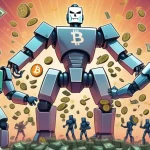Decentralized AI: Crypto’s Redemption and the Future of Equitable Technology

AI is Crypto’s Redemption, and the Next Generation’s Big Bet
Both cryptocurrency and artificial intelligence (AI) hold the potential to transform the world, yet they face significant hurdles. Cryptocurrency has struggled with speculation and failed decentralization, while AI risks being monopolized by corporations, leading to increased surveillance and inequality. However, the emergence of decentralized AI networks like Bittensor and BitMind offers a promising path forward, merging blockchain technology with AI to create a more equitable and transparent system.
- Crypto’s unfulfilled promise of decentralization
- AI’s risk of corporate control and surveillance
- Decentralized AI networks: Bittensor and BitMind
- Incentive model fostering equitable development
- Broader societal impact of decentralized AI
Technologies such as the internet and mobile devices were initially celebrated as tools that would empower individuals and foster democracy. Yet, as Alex Karp, CEO of Palantir, noted, “Modern technology, from the internet and mobile devices, once heralded as tools of democracy and liberation, has become engines of surveillance and profit, reshaping society to favor big businesses over people.” Similarly, cryptocurrency was touted as a decentralized revolution, but it has been largely bogged down by speculation and unfulfilled promises. It’s clear that crypto has not lived up to its initial vision of decentralizing power and wealth.
AI, on the other hand, has the power to revolutionize healthcare, governance, and countless other fields. Yet, its control by a handful of corporations raises alarms about increased inequality and surveillance. The challenge lies in harnessing AI’s capabilities for the greater good, ensuring that it benefits society as a whole, not just a select few.
Enter decentralized AI, a potential game-changer that could redeem both cryptocurrency and AI. By integrating blockchain technology with AI, decentralized AI networks like Bittensor and BitMind offer a model where contributions to AI development are rewarded transparently and equitably. Bittensor, a decentralized AI network, uses its native token, TAO, to incentivize participants for contributing computational resources and improving AI models. BitMind, co-founded by Ken Jon Miyachi, leverages the Bittensor network for distributed deepfake detection and other AI applications, emphasizing transparency and accuracy in AI model development. In these networks, “decentralization changes how AI rewards work so that rewards and governance flow to the true value creators rather than being concentrated within a single company.”
The incentive model of decentralized AI is revolutionary. Unlike traditional models where rewards are often hoarded by a single entity, decentralized AI networks reward every improvement and contribution in real-time through blockchain-based transactions. This creates a sustainable business model for open-source AI development, ensuring that the fruits of AI labor are shared widely.
The broader implications of decentralized AI are profound. By democratizing AI development and preventing its monopolization by corporations, decentralized AI could reshape industries and governance in a more equitable manner. It could fulfill crypto’s original promise of democratizing money and power, as “Crypto promised to democratize money but got lost in speculation. Decentralized AI redeems this vision by creating a sustainable incentive and economic model for open-source AI development.”
Ken Jon Miyachi, with his extensive background in software engineering at companies like NEAR Foundation, Amazon, and Polymer Labs, and his research at the San Diego Supercomputer Center, brings a wealth of experience to BitMind’s mission. His work highlights how decentralized AI can tackle real-world challenges like deepfake detection, showcasing the tangible impact of these initiatives.
Looking ahead, the potential for decentralized AI to redeem both cryptocurrency and AI is clear. By leveraging blockchain technology to ensure transparent and equitable rewards for contributions, decentralized AI networks like Bittensor and BitMind are paving the way for a more collaborative and less centralized development model. This could be crypto’s most significant legacy, ensuring that the next generation’s big bet on AI pays off for everyone, not just a select few.
Of course, the road ahead won’t be smooth. The crypto space is full of scammers promising the moon, and the AI industry has its share of overhyped promises. But by focusing on the real-world applications and sustainable economic models offered by decentralized AI, we can cut through the bullshit and drive meaningful adoption.
Key Questions and Takeaways
What are the current challenges facing cryptocurrency and AI?
Cryptocurrency has been criticized for being overly speculative and failing to fulfill its promise of decentralization. AI faces risks of increasing inequality and surveillance due to control by a few corporations.
How can decentralized AI help address these challenges?
Decentralized AI can integrate blockchain technology to ensure transparent and equitable rewards for contributions, fostering a more collaborative and less centralized development model.
What is the significance of projects like Bittensor and BitMind?
They exemplify how decentralized AI can work in practice, providing real-world applications like deepfake detection and rewarding contributors transparently.
What could be the broader impact of decentralized AI on society?
By ensuring that AI development benefits are widely shared, decentralized AI could democratize the technology and prevent it from being monopolized by a few corporations, potentially reshaping industries and governance in a more equitable way.
How does the incentive model of decentralized AI differ from traditional models?
In decentralized AI, every improvement and contribution is rewarded in real-time through blockchain-based transactions, creating a sustainable business model for open-source development, unlike traditional models where rewards are often concentrated within a single company.



